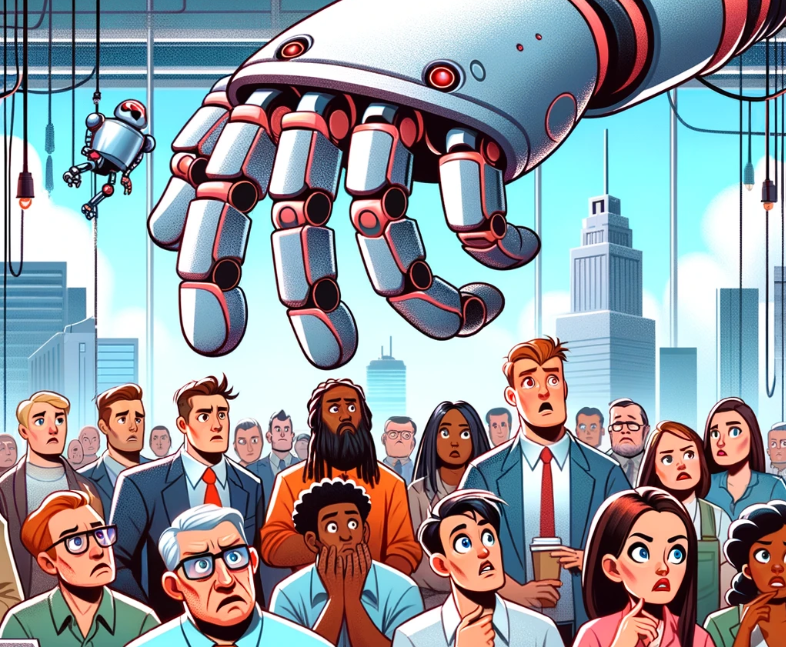AI’s Double-Edged Sword: Boosting Productivity, Threatening Jobs
The Big Picture: In a striking new analysis by the International Monetary Fund (IMF), a spotlight is thrown on artificial intelligence (AI) – a technological force poised to reshape nearly 40% of all jobs globally. This isn’t just a tech story; it’s a profound economic and social shift.
Deep Dive: Kristalina Georgieva, IMF’s managing director, paints a nuanced picture. While AI could supercharge productivity and innovation, it’s also likely to exacerbate existing inequalities. Her message is clear: this is a “troubling trend” that demands urgent policy action to prevent it from fueling social unrest.
Advanced Economies at the Forefront
The Stark Contrast: The impact of AI is uneven. In advanced economies, up to 60% of jobs could feel the AI effect. But it’s a mixed bag – half of these workers might see their productivity soar thanks to AI integration. The other half? They face a harsher reality where AI could replace key aspects of their jobs, potentially leading to reduced labor demand, lower wages, or even job loss.
The Developing World’s Dilemma
The Challenge of Inequality: The story changes in low-income countries, where only about 26% of jobs might be impacted by AI. But here’s the catch: many of these nations lack the infrastructure or skilled workforce to harness AI’s benefits. Georgieva warns that this could widen the gap between nations, deepening global inequality.
Insights from Goldman Sachs
A Parallel Analysis: Echoing the IMF’s concerns, a 2023 report from Goldman Sachs estimated that AI could replace the equivalent of 300 million full-time jobs. Yet, there’s a silver lining – potential new job creation and a productivity boom.
The Demographic Divide
Who Wins, Who Loses?: The IMF’s analysis suggests a demographic split. Higher-income and younger workers might enjoy a wage boost post-AI adoption. In contrast, lower-income and older workers risk falling behind.
Inclusive Strategies: A Way Forward
Georgieva’s Call to Action: To combat these challenges, Georgieva emphasizes the need for robust social safety nets and retraining programs. Her vision is to steer the AI transition towards inclusivity, safeguarding livelihoods and curtailing inequality.
Global Dialogue: This IMF analysis is timely, coinciding with the gathering of world leaders
and business moguls at the World Economic Forum in Davos, Switzerland. This convergence of minds provides a crucial platform for discussing and strategizing on how to navigate the AI landscape. It’s an opportunity to harmonize technological advancement with human-centric policies.
Looking Ahead: Embracing Change Responsibly
The Roadmap for Change: The conversation doesn’t stop here. As AI continues to evolve, so must our strategies to integrate it into our global workforce. Policymakers, business leaders, and educators need to collaborate to ensure that AI serves as a catalyst for growth and equity, rather than a divider.
The Role of Education and Training
Empowering the Workforce: A significant part of this adjustment involves education and training. Upskilling and reskilling programs are not just beneficial; they’re essential to prepare the current and future workforce for an AI-driven world. These initiatives can help bridge the gap between the existing skill sets and those required in an AI-augmented job market.
Global Cooperation: The Key to Balanced Growth
Uniting for a Common Goal: The IMF’s analysis underscores the importance of global cooperation in the age of AI. By sharing knowledge, resources, and best practices, countries can collectively work towards harnessing the benefits of AI while minimizing its risks.
The Ethical Dimension
AI with a Human Touch: Beyond the economic implications, there’s a vital ethical dimension to AI’s integration into the workforce. Ensuring that AI systems are fair, transparent, and accountable is crucial to maintaining public trust and social stability.
Final Thoughts: Navigating the AI Revolution
A Call for Optimistic Caution: As we stand on the brink of a significant technological revolution, the message is one of optimistic caution. Embracing AI’s potential while remaining vigilant about its challenges can lead us into an era of unprecedented growth and opportunity. The key lies in thoughtful, inclusive, and forward-thinking policies that ensure AI benefits everyone.
Stay tuned: The narrative around AI and employment is rapidly evolving. Keeping abreast of these changes is vital for policymakers, business leaders, and individuals alike. As AI reshapes the employment landscape, staying informed and adaptive will be crucial for navigating the future successfully.





